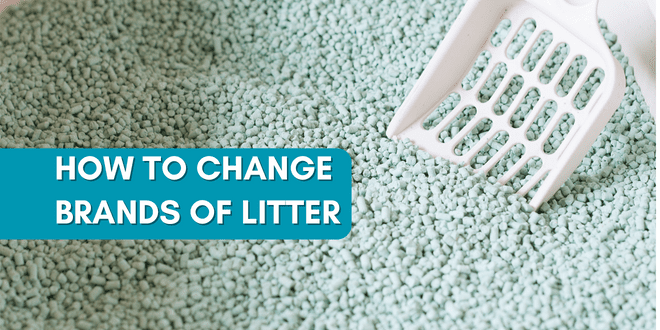
Cats take comfort in predictability and routine and if you want to avoid creating unnecessary stress, it’s important to keep that in mind when you’re planning on introducing anything unfamiliar. You may think I’m only referring to major changes, but for many cats, even a minor change can be upsetting.
The type of litter you put in your cat’s litter box will have a significant influence on whether he successfully chooses that location for elimination or whether he ends up peeing on your carpet. Litter scent (or lack of), texture, cleanliness, and depth, all play a factor in litter box appeal. So if you plan on switching to a new brand or type of litter, there are two ways to do it.
Option 1: Gradual Changeover to the New Cat Litter
This method gives your cat time to adjust to the difference without it being overwhelming. In most cases, if you go slowly enough, your cat won’t even realize a change is taking place.
The way to do the gradual changeover is to mix a small amount of the new litter in with the current brand every day for several days. This changeover should typically take place over about five days. If previous experience has taught you that your cat really reacts negatively to change, then it’s best to stretch out the changeover for a few extra days.
If you’re switching from a traditional non-clumping clay litter to a scoopable litter then keep in mind that the new litter won’t effectively form clumps until there’s very little of the old litter left.
Option 2: Litter Box Buffet Line
If you know your cat doesn’t like the current brand of litter but are unsure what type of litter he would prefer, set out an additional litter box with a new type or brand. Keep the current litter box with the usual brand as well. Your cat will let you know which one is preferred. You can do this with multiple additional boxes if you’re undecided between a few types of litter.
Once your cat has been successfully and routinely using the new litter you can remove the other litter boxes.
No Abrupt Changes When it Comes to Cat Litter
The worst thing you can do when it comes to changing litter brands or types is to merely dump out the contents of the current box and fill it with an unfamiliar litter. Every time your cat goes to the litter box, as a creature of habit, he’s expecting to come across the same texture against his paw pads and the same scent (or non-scent). Even if you’re absolutely sure your cat will like the new litter better, use one of the above two methods rather than risk rejection due to the unpleasant element of surprise.
Need More Information?
If you’re experiencing a litter box aversion problem with your cat make sure you have kitty examined by the veterinarian to rule out any possible underlying medical cause.
For more information about cat behavior and training, refer to the books by Pam Johnson-Bennett. Pam’s books are available at bookstores and online. We’ve included links to Amazon here on our website.

If you have a question regarding your cat’s health, please contact your veterinarian. This article is not intended as a replacement for your cat’s veterinary care.
 Problem Solving & Advice by Pam Johnson-Bennett Cat Behavior Expert & Best-selling Author
Problem Solving & Advice by Pam Johnson-Bennett Cat Behavior Expert & Best-selling Author


